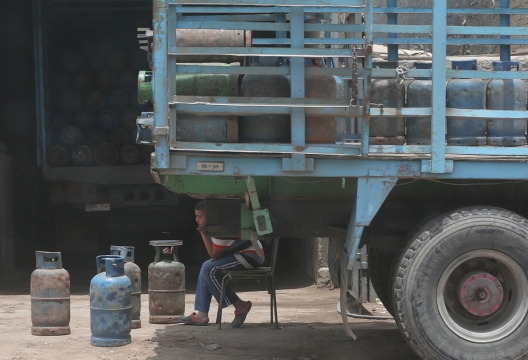 Now that Abdel Fattah al-Sisi has been elected president, Egyptians await to see what measures he will undertake to ease economic burdens and improve living conditions. A priority for most citizens are the recurrent, and growing, energy shortages in the face of peak demand season. Although energy shortages and blackouts are not a new phenomenon, the frequency and length of blackouts in the last two years is a mounting concern and a source of instability due to widespread public frustrations.
Now that Abdel Fattah al-Sisi has been elected president, Egyptians await to see what measures he will undertake to ease economic burdens and improve living conditions. A priority for most citizens are the recurrent, and growing, energy shortages in the face of peak demand season. Although energy shortages and blackouts are not a new phenomenon, the frequency and length of blackouts in the last two years is a mounting concern and a source of instability due to widespread public frustrations.
The latest round of energy shortages Egyptians are experiencing are rooted in structural issues and pricing policies supported by an extensive system of subsidies. The crisis has been further exacerbated by economic challenges the country has faced in the last four years. Following the 2011 uprising, the economic situation in Egypt deteriorated rapidly leading to a balance of payments crunch as capital began to flow out of the country and the stock of foreign exchange reserve depleted rapidly. To assist with the economic downturn, friendly Arab Gulf countries, particularly Kuwait, Saudi Arabia, and the United Arab Emirates, provided $20 billion in financial assistance since June 30, 2013. Although, Gulf money helped to arrest the economic downturn, at least in the short-term, structural issues that plague the energy sector cannot be solved with Gulf assistance alone.
In the late 1990s-early 2000s, when the economy was growing at a fairly rapid pace, Egyptian authorities implemented a series of measures allocating subsidized natural gas towards domestic consumption and for power generation of plants and factories. Subsidies have distorted incentives, and as a result, consumption of natural gas increased as the country has come to rely on natural gas as the main source of electricity generation. But in a country of nearly 90 million citizens facing a balance of payments deficit and dwindling foreign exchange reserves, subsidizing energy is no longer a viable policy choice.
A few years after Egypt emerged as an exporter of piped natural gas and liquefied natural gas (LNG), the country is now importing gas to cover domestic use. The Egyptian government is forced to buy fuel on the global market and resell it at a loss domestically. The price difference has accumulated to about $6 billion of debt to international oil companies (IOCs) who operate under a production sharing agreement with the Egyptian government. The agreement facilitates that IOCs provide technical expertise and investment and capital necessary to develop Egypt’s petroleum resources. In return, IOCs receive a share of the petroleum for export, while the rest is allocated for domestic consumption and for Egypt to export for profit.
In the last few years, a greater share of the IOCs’ petroleum share has been allocated towards domestic consumption, compounding debt obligations. Although, Egyptians have made some payments to IOCs and are seeking bids for new LNG import terminals, most recently with Norway, they are unable to repay their debt entirely or free up more gas. Debt to IOCs has been detrimental to the gas sector because it has left many companies either unwilling or unable to invest in increasing natural gas production constraining operation and growth of the energy sector. In turn, multinational oil corporations have stopped production thus worsening the energy crisis.
President Sisi appears to recognize the need to reform energy subsidies, albeit gradually, because subsidies have proven unsustainable. The question is whether Egyptians are willing to alter the social contract they have grown accustomed to and endure austerity measures necessary to improve living conditions? Although lifting subsidies will not be easy, it is a necessary measure if Sisi is to contain the budget deficit. Reforming the subsidies system calls for structural reforms such as raising the price of natural gas to match international market prices. Undoubtedly, Sisi will encounter resistance from the public and energy-intensive businesses who benefit the most from the subsidies. Sisi will most likely turn once again to Gulf donors for fuel, but if he wants to solve, or at least contain, the energy crisis, he will have to raise the price of electricity to reduce consumption and incentivize IOCs to invest in the gas sector. Therefore, in the long-run altering energy prices will target consumption, demand, and help revitalize growth.
Svetlana Milbert is an assistant director for the Atlantic Council’s Rafik Hariri Center with a focus on the economics of transitioning Arab countries.
Image: Photo: A boy sits at a center for buying and exchanging gas cylinders, on the outskirts of Cairo May 19, 2014. (Reuters/Asmaa Waguih)
